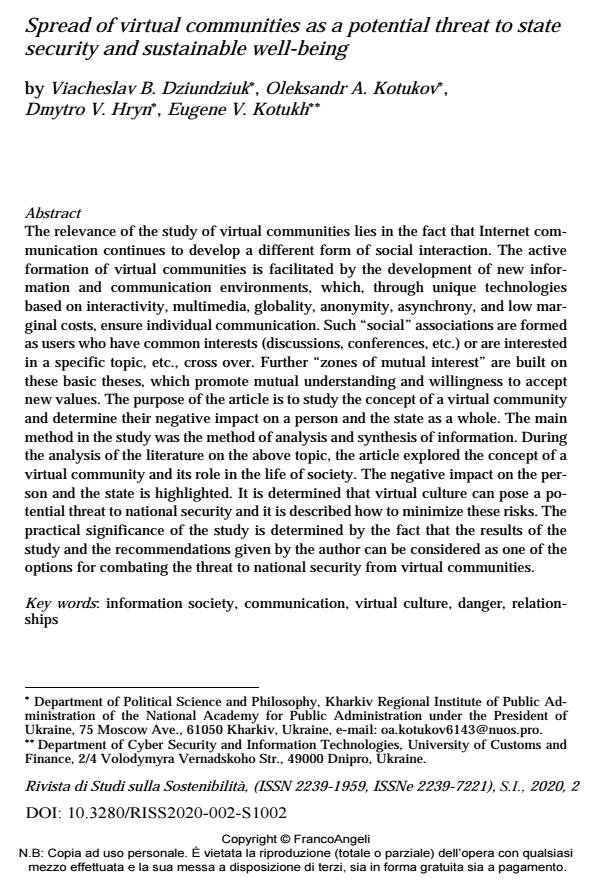Spread of virtual communities as a potential threat to state security and sustainable well-being
Titolo Rivista RIVISTA DI STUDI SULLA SOSTENIBILITA'
Autori/Curatori Viacheslav B. Dziundziuk, Oleksandr A. Kotukov, Dmytro V. Hryn, Eugene V. Kotukh
Anno di pubblicazione 2021 Fascicolo 2020/2 suppl.
Lingua Inglese Numero pagine 12 P. 7-18 Dimensione file 119 KB
DOI 10.3280/RISS2020-002-S1002
Il DOI è il codice a barre della proprietà intellettuale: per saperne di più
clicca qui
Qui sotto puoi vedere in anteprima la prima pagina di questo articolo.
Se questo articolo ti interessa, lo puoi acquistare (e scaricare in formato pdf) seguendo le facili indicazioni per acquistare il download credit. Acquista Download Credits per scaricare questo Articolo in formato PDF

FrancoAngeli è membro della Publishers International Linking Association, Inc (PILA), associazione indipendente e non profit per facilitare (attraverso i servizi tecnologici implementati da CrossRef.org) l’accesso degli studiosi ai contenuti digitali nelle pubblicazioni professionali e scientifiche.
The relevance of the study of virtual communities lies in the fact that Internet communication continues to develop a different form of social interaction. The active formation of virtual communities is facilitated by the development of new information and communication environments, which, through unique technolo-gies based on interactivity, multimedia, globality, anonymity, asynchrony, and low marginal costs, ensure individual communication. Such "social" associations are formed as users who have common interests (discussions, conferences, etc.) or are interested in a specific topic, etc., cross over. Further "zones of mutual interest"are built on these basic theses, which promote mutual understanding and willingness to accept new values. The purpose of the article is to study the concept of a virtual community and determine their negative impact on a person and the state as a whole. The main method in the study was the method of analysis and synthesis of information. During the analysis of the literature on the above topic, the article ex-plored the concept of a virtual community and its role in the life of society. The negative impact on the person and the state is highlighted. It is determined that vir-tual culture can pose a potential threat to national security and it is described how to minimize these risks. The practical significance of the study is determined by the fact that the results of the study and the recommendations given by the author can be considered as one of the options for combating the threat to national secu-rity from virtual communities.
Parole chiave:Information society, communication, virtual culture, danger, relationships
Viacheslav B. Dziundziuk, Oleksandr A. Kotukov, Dmytro V. Hryn, Eugene V. Kotukh, Spread of virtual communities as a potential threat to state security and sustainable well-being in "RIVISTA DI STUDI SULLA SOSTENIBILITA'" 2 suppl./2020, pp 7-18, DOI: 10.3280/RISS2020-002-S1002